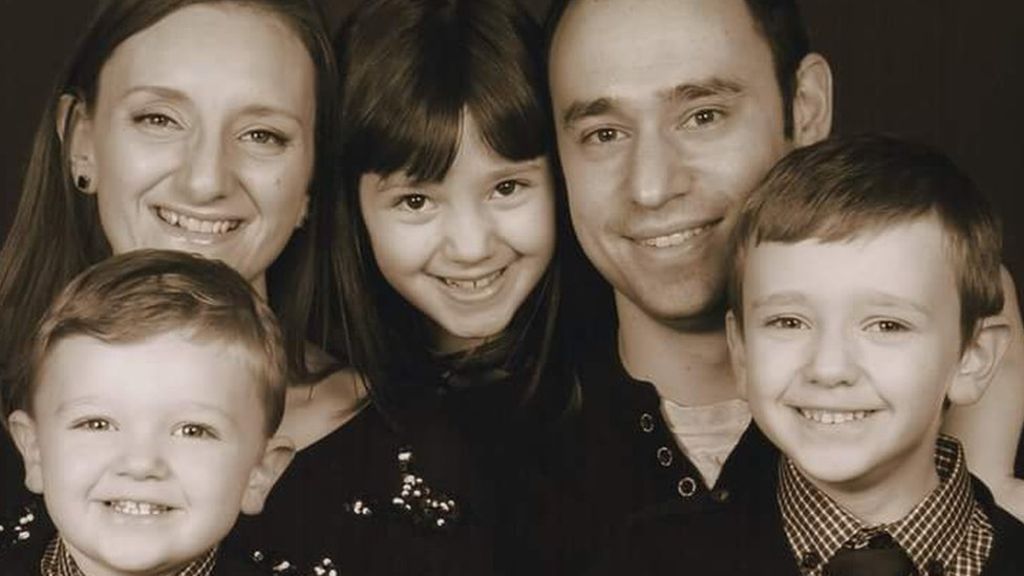What is it like to be ‘just about managing’? – BBC News


The government is expected to promise help in the Autumn Statement for a newly defined group – the Jams, those households only “just about managing” to make ends meet.
There is no precise definition of a Jam household, but these families tend to have at least one person in work, are struggling to get by, and often have less than a month’s income’s worth of savings.
There are about six million households in this situation, according to the Resolution Foundation.
The BBC News website asked three families who identified themselves as “just about managing” what they wanted to hear from Chancellor Philip Hammond.
We will return to them after the Autumn Statement on Wednesday to see if the government has met their concerns.
David Watssman, 34, Invergordon, near Inverness
 Image copyright David Watssman
Image copyright David Watssman ‘My wife works part-time, but half her money is lost to childcare’
I have three children, and I work full-time while my wife works part-time, and together we earn around 36,000. We’ve worked hard all our lives, don’t smoke or drink, don’t have expensive hobbies, don’t have any great debts and watch our money carefully.
Still, we just manage to keep our heads above water. It’s harder than it should be and is so difficult to have a decent lifestyle and make the finances work.
We haven’t been on holiday for a couple of years – and the last time we went was after we had a windfall. I haven’t seen much of a wage rise recently.
I work in the salmon industry, and that has been hit by fish prices and the drop in the pound. I don’t see many job prospects up here – but if I was to move the family away, that would mean extra costs in terms of housing.
We have just sold our house and are looking to move but are currently living with my in-laws. If we didn’t have family to rely on, it would be very difficult.
Half of my wife’s money is lost to childcare and the one thing I’d like to see the government do is increase the number of hours of subsidised childcare. Childcare costs is the one thing that is really stifling us, as my wife has to turn down work because of it.
Lisa Shimmins, 30, Bembridge, Isle of Wight
 Image copyright Lisa Shimmins
Image copyright Lisa Shimmins ‘Everyone who works hard deserves to earn a decent wage’
We just about get by – but after we pay our rent, council tax and all the other bills, there’s not a lot left. We can’t save.
My partner works while I look after our young children, aged six years, two, and four months. He works really hard as a builder and earns about 12 an hour. He’s self-employed, so the amount he earns varies and if he is sick, we lose out on money.
If we have a problem with the car, or if my partner needs a certain tool for work, we might not have the money to make the rent or council tax. So we end up paying much more later. When we go shopping, sometimes we can’t believe we haven’t got any money despite working.
It feels like people who are not working are better off.
It’s unfair that you have to have [high level] education to make a decent living. Everyone who works hard deserves to earn a decent wage.
We’d like to buy a property, but we just can’t save up.
The one thing I’d like to hear from the government is help for people like us to buy a home. Everyone should be entitled to a house.
I also think that people on lower wages should pay less tax.
Sarah Kershaw, 48, Ickenham, north-west London
 Image copyright Sarah Kershaw
Image copyright Sarah Kershaw ‘The last week of the month is tough’
I am a single mum, working full-time, paying my own mortgage and all my own bills. I work in a children’s centre as a receptionist and earn just over 21,000.
I have a daughter at university, and I claim child tax credits, which I have to use to help her pay her rent. She is the last year of students to receive a grant, but it still isn’t enough for her to pay rent and living costs.
My son is at college, but I worry that I won’t be able to help him go to university, because when he goes to university, the grants will have been abolished.
I’m not officially low-income, although I don’t earn very much at all, so I don’t qualify for any help with housing costs or my income.
There is no money for luxuries, holidays, new clothes or nights out for me.
I try very hard to make sure the kids don’t miss out, but I end up staying in all the time as I can’t afford to go out. We get to the end of the month, and the bills are all paid. Sometimes I think I don’t quite know how. I would never borrow money – no payday loans. The last week of the month is tough.
I went on a budgeting course run by Christians Against Poverty.
I don’t have large debts, I don’t smoke, drink, gamble and I try to give to charity monthly and I volunteer every month.
I do everything I can to work hard and pay my own way, yet my situation is getting worse and worse. If interest rates go up, I’m going to find things even harder.
We’re also in the process of moving to a cheaper area in Hertfordshire.
What do I want from government? I’d like them to reduce university fees and reinstate maintenance grants.
I’d like them to re-examine the level they call low income. Whilst people’s wages can potentially go up, they don’t go up in line with costs.
By Nathan Williams and Sherie Ryder, UGC and Social News team